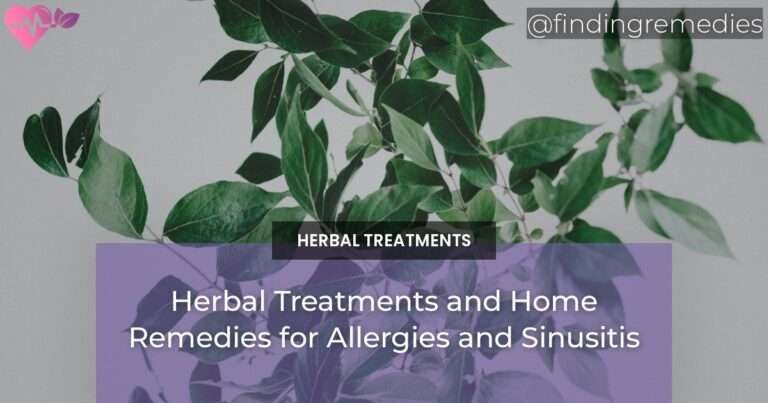Allergies and sinusitis can be incredibly bothersome, causing congestion, discomfort, and a general feeling of malaise. While there are many pharmaceutical options available to help alleviate these symptoms, some individuals prefer to explore natural remedies. Herbal treatments offer an alternative approach that can be effective in managing allergies and sinusitis. In this comprehensive article, we will explore a variety of herbs and home remedies that can provide relief. From nettle and butterbur to spirulina and quercetin, we will delve into the unique properties of each herb and how they can combat allergies and sinusitis. Additionally, we will discuss sinus rinses, anti-inflammatory herbs, safety data, and pediatric use. Let us embark on this journey through the world of botanical medicine and herbal therapeutics to discover the power of herbs in tackling allergies and sinusitis.
Herbal Treatments for Allergies and Sinusitis
Nettle
Nettle, also known as stinging nettle, is a perennial herb that has been used for centuries in traditional medicine to treat allergies and sinusitis. It contains compounds that possess anti-inflammatory properties, which help reduce congestion and alleviate symptoms. Nettle can be consumed as a tea or taken in supplement form. Some studies have shown that nettle can effectively relieve allergy symptoms, including nasal congestion and itching. It is important to note that nettle may interact with certain medications, so it is advisable to consult with a healthcare professional before incorporating nettle into your treatment regimen.
Butterbur
Butterbur is another herb that has shown promise in managing allergies and sinusitis. It contains active compounds that possess antihistamine and anti-inflammatory properties, making it effective in reducing nasal congestion and sneezing. Butterbur is available in various forms, including capsules, tablets, and extracts. It is important to ensure that the butterbur product you choose is labeled “PA-free,” as certain chemicals found in butterbur can be harmful to the liver. As with any herbal treatment, it is advisable to consult with a healthcare professional before incorporating butterbur into your regimen.
ALSO READ
Spirulina
Spirulina is a type of blue-green algae that has gained popularity as a superfood. It is rich in various nutrients and antioxidants, which contribute to its potential therapeutic effects. Spirulina has been studied for its ability to modulate the immune system and reduce inflammation, making it useful in managing allergies and sinusitis. It is available in powder or tablet form and can be easily incorporated into your daily routine. However, individuals with autoimmune conditions should exercise caution when using spirulina, as it may stimulate the immune system.
Quercetin
Quercetin is a flavonoid that is found in various fruits, vegetables, and herbs. It possesses potent antioxidant and anti-inflammatory properties, making it a popular choice for managing allergies and sinusitis. Quercetin works by stabilizing mast cells, which release histamine and other inflammatory substances during allergic reactions. By inhibiting mast cell activation, quercetin can help alleviate symptoms such as nasal congestion, sneezing, and itching. It is available as a dietary supplement and can be taken alongside other herbal treatments for enhanced efficacy.
Stinging Nettle
Stinging nettle, also known as Urtica dioica, is a well-known herb used in herbal therapeutics for its potential in managing allergies and sinusitis. It contains biologically active compounds, including flavonoids and phenolic acids, which possess anti-inflammatory and anti-allergic properties. Stinging nettle can be consumed as a tea or taken in supplement form. It is believed to work by inhibiting the production of pro-inflammatory cytokines and histamine, thereby reducing nasal congestion and other allergy symptoms. However, individuals with certain medical conditions, such as diabetes or hypertension, should exercise caution when using stinging nettle and consult with a healthcare professional.
Sinus Rinses
Sinus rinses, also known as nasal irrigation, are a popular home remedy for relieving nasal congestion and sinusitis symptoms. They involve using a saline solution to flush out the nasal passages, removing excess mucus and irritants. Sinus rinses can be performed using a variety of devices, such as a neti pot or nasal irrigation bottle. The saline solution can be prepared using a pre-made mixture or by dissolving salt and baking soda in distilled water. Sinus rinses can provide immediate relief by reducing inflammation and clearing the nasal passages. However, it is important to ensure proper technique and hygiene to avoid potential complications.
Anti-inflammatory Herbs
In addition to nettle and butterbur, several other herbs possess anti-inflammatory properties that can help alleviate allergies and sinusitis symptoms. Some notable examples include ginger, turmeric, and bromelain. Ginger has been traditionally used to reduce inflammation and relieve congestion. It can be consumed as a tea or added to meals for its warming and soothing effects. Turmeric contains curcumin, a compound with potent anti-inflammatory properties. It can be incorporated into dishes or taken as a dietary supplement. Bromelain, derived from pineapple, has been shown to reduce nasal swelling and improve sinusitis symptoms. It is available in supplement form and can be taken on an empty stomach for optimal absorption.
Safety Data
While herbs offer a natural approach to managing allergies and sinusitis, it is important to consider safety precautions. Some herbs may interact with medications or have potential side effects. Additionally, certain individuals, such as pregnant or breastfeeding women, may need to exercise caution when using herbal remedies. It is advisable to consult with a healthcare professional before incorporating herbs into your treatment regimen, especially if you have any underlying medical conditions or are taking medications. They can provide personalized guidance and ensure the safe and effective use of herbal treatments.
Pediatric Use
When it comes to pediatric use, it is essential to exercise caution and consult with a healthcare professional before using herbs to manage allergies and sinusitis in children. Children may have different sensitivities and reactions to herbs compared to adults. Some herbs may not be suitable for children due to potential side effects or interactions with other medications. It is recommended to work closely with a healthcare professional experienced in pediatric herbal therapeutics to ensure the safety and efficacy of herbal treatments for children.
RELATED ARTICLES:

